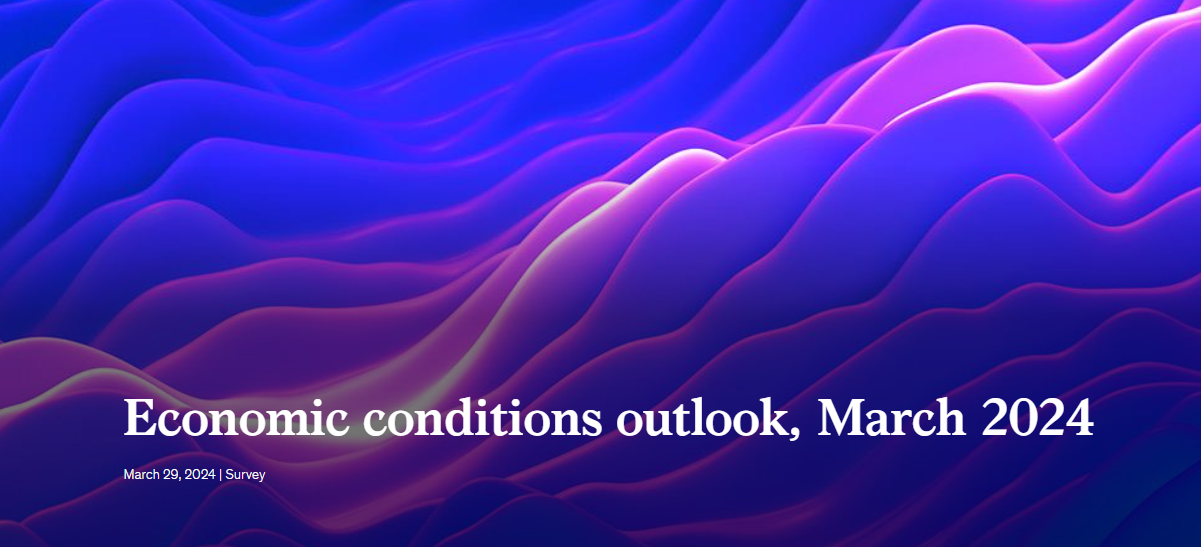
Executives’ latest views on the global economy and their countries’ economies lean much more positive than they did at the end of 2023.
In the latest McKinsey Global Survey on economic conditions, the outlook on domestic conditions in most regions has become more hopeful, despite ongoing shared concerns about geopolitical instability and conflicts. In a year brimming with national elections, respondents increasingly see transitions of political leadership as a primary hazard to the global economy, particularly in Asia–Pacific, Europe, and North America.
Furthermore, respondents now view policy and regulatory changes as a top threat to their companies’ performance, and they offer more muted optimism than in December about their companies’ prospects.
Optimism builds over global and domestic conditions
Respondents share much brighter assessments of the global economy and conditions in their countries than they did at the end of 2023, and views of the global economy are the most positive they’ve been since March 2022 (Exhibit 1). In the December survey, respondents were equally likely to say the global economy had improved and worsened. Today, respondents are twice as likely to report improving rather than deteriorating conditions. Looking ahead to the next six months, respondents are also more optimistic than they were last quarter. Forty-six percent expect the global economy to improve—nearly double the share expecting worsening conditions—while 37 percent expected improvement in the previous survey.

Likewise, respondents offer hopeful views when asked about the most likely near-term scenario for the global economy, suggesting confidence in central banks. They are more likely to expect a soft landing overall—with either slowing or accelerating growth compared with 2023—than a recession (Exhibit 2). The largest share of respondents expect a soft landing, with slowing growth relative to 2023.

Respondents’ views on their own economies have also become more upbeat. Nearly half of respondents say economic conditions at home are better now than they were six months ago, up from 41 percent in December, while just 22 percent say conditions have gotten worse. Respondents in Europe—who offered the most negative assessments of any respondents in September and December—are now nearly twice as likely as in December to say conditions have improved in the past six months, though it is unclear what has prompted that change and whether it is a durable finding.

More than half of respondents expect their economies to improve over the next six months. It’s the first time in two years that a majority of respondents have said that. In most regions, larger shares of respondents express optimism about economic conditions at home now than in December (Exhibit 3).

Geopolitical instability remains top of mind as concerns over political transitions rise
Geopolitical instability and conflict continues to be the most cited risk to global growth, selected by two-thirds of respondents for the second quarter in a row (Exhibit 4). Yet in this first quarterly survey of 2024—a year in which more than 60 countries will hold national elections—transitions of political leadership have jumped from the fifth-most-cited to the second-most-cited threat to the world economy. The share of respondents in Europe reporting political transitions as a top threat is 2.4 times the share in December, while the shares in North America and Asia–Pacific have nearly doubled. We see a smaller uptick in concern about supply chain disruptions, which is cited as a threat by the largest share of respondents since December 2022.

Looking at risks to growth in respondents’ countries, geopolitical instability and conflict remains the top perceived threat, cited by a larger share than in any quarter since March 2022. Uneasiness about domestic political conflicts and transitions of political leadership, now the second- and third-most-cited risks, have overtaken concerns about inflation, which was the second-most-cited risk in December. Among respondents in North America, transitions of political leadership are cited nearly twice as often as in December (Exhibit 5). In Greater China, multiple risks now appear to carry equal weight, whereas in December, inflation was the top concern.

Policy and regulatory changes top the list of cited threats to companies’ growth
As respondents’ concerns about inflation as a domestic threat wane, the survey results suggest that companies are holding off on price increases. For the first time since we began asking about companies’ prices in September 2022, less than half of private-sector respondents in the latest survey—45 percent—say their companies increased the price of their goods or services over the past six months, down from 56 percent in December.
For five quarters, respondents’ most cited risk to their companies’ performance in the next 12 months was weak customer demand. Now, they most often point to policy and regulatory changes as a threat. In December 2023, policy and regulatory changes weren’t even one of the top five perceived risks. This increased wariness of policy changes cuts across most regions, though we see the largest increase in Europe.
Even though weak demand is no longer the most cited risk for companies, optimism over expected demand has tapered since December. Fifty-one percent of respondents expect an increase in customer demand over the next six months, down from 57 percent in December. Yet expectations about profits remain upbeat: about six in ten respondents expect increasing profits in the months ahead, in line with expectations in much of 2023.
The post "Economic conditions outlook, March 2024" appeared first on McKinsey Insights








0 Comments